Louis and Katherine Kealoha, 2 co-defendants found guilty of conspiracy, obstruction

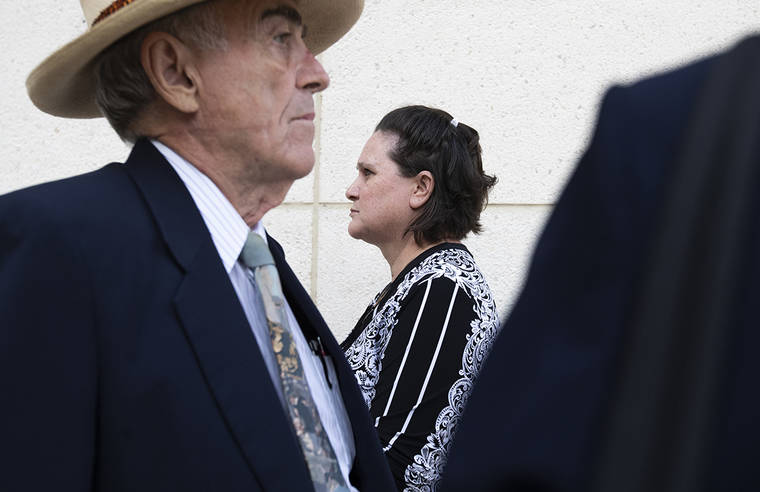
CINDY ELLEN RUSSELL / CRUSSELL@STARADVERTISER.COM
A jury found Katherine and Louis Kealoha guilty of all five counts of their conspiracy and obstruction charges on Thursday. Two of the co-defendants were found guilty of obstruction. Pictured is Katherine Kealoha waiting at the bottom of the federal courthouse stairs as Louis Kealoha spoke to the press.
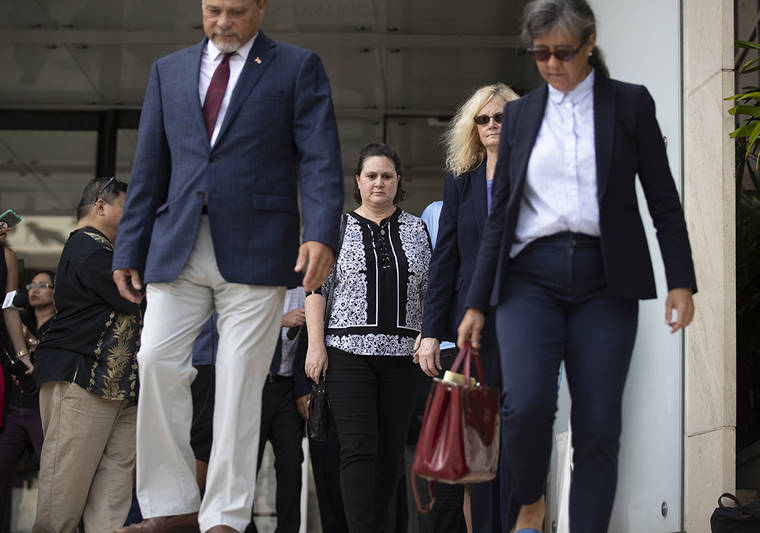
CINDY ELLEN RUSSELL / CRUSSELL@STARADVERTISER.COM
After one day of deliberation a jury found Katherine and Louis Kealoha guilty of all five counts in their conspiracy and obstruction charges today. Pictured is Katherine Kealoha, center, surrounded by her legal team after the verdict. Pictured is Katherine Kealoha leaving the federal courthouse after the verdict.
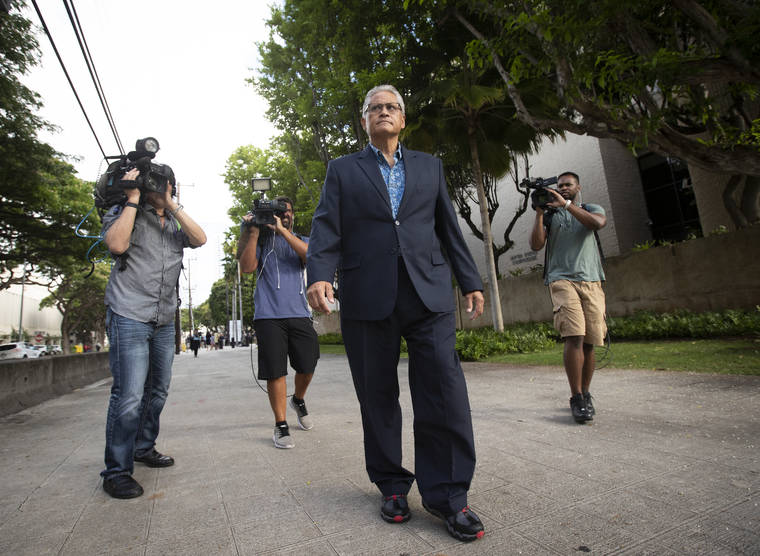
CINDY ELLEN RUSSELL / CRUSSELL@STARADVERTISER.COM
A jury found Katherine and Louis Kealoha guilty of all five counts of their conspiracy and obstruction charges today. Two of the co-defendants were found guilty of obstruction. Pictured is Louis Kealoha walking behind Katherine, surrounded by media, after the verdict.
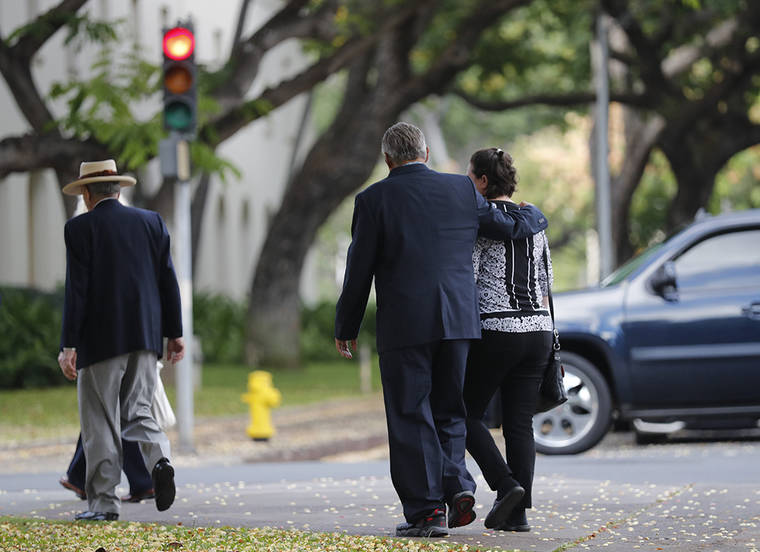
CINDY ELLEN RUSSELL / CRUSSELL@STARADVERTISER.COM
A jury found Katherine and Louis Kealoha guilty of all five counts of their conspiracy and obstruction charges today. Two of the co-defendants were found guilty of obstruction. The Kealohas are pictured walking to Queen Street after the verdict.
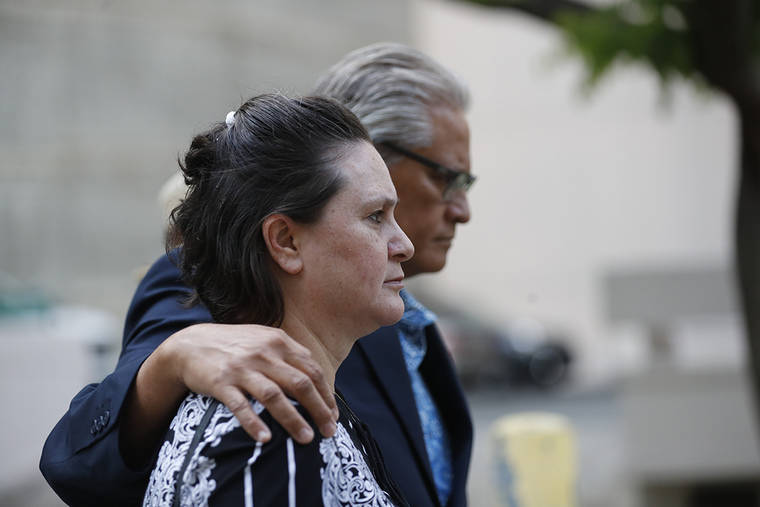
CINDY ELLEN RUSSELL / CRUSSELL@STARADVERTISER.COM
After one day of deliberation a jury found Katherine and Louis Kealoha guilty of all five counts in their conspiracy and obstruction charges today. Pictured is Katherine Kealoha, center, surrounded by her legal team after the verdict. The couple are pictured walking toward Queen St. after the verdict at federal court.
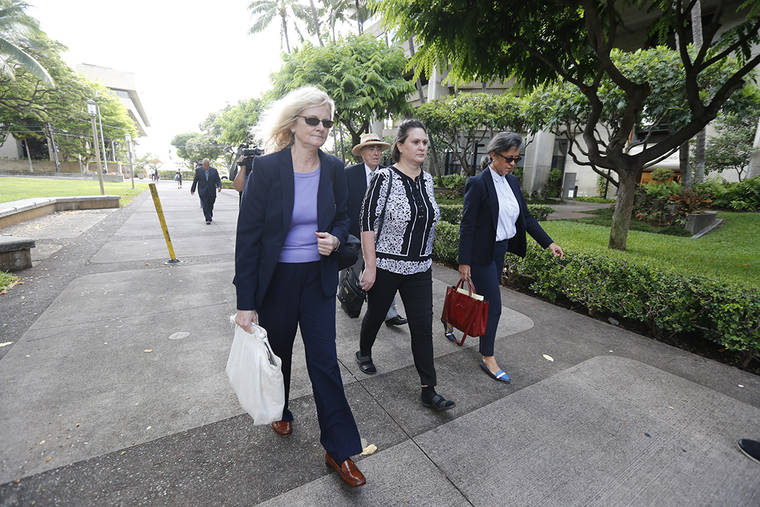
CINDY ELLEN RUSSELL / CRUSSELL@STARADVERTISER.COM
After one day of deliberation a jury found Katherine and Louis Kealoha guilty of all five counts in their conspiracy and obstruction charges today. Pictured is Katherine Kealoha, center, surrounded by her legal team after the verdict. Louis Kealoha is seen trailing behind her about 20 feet.
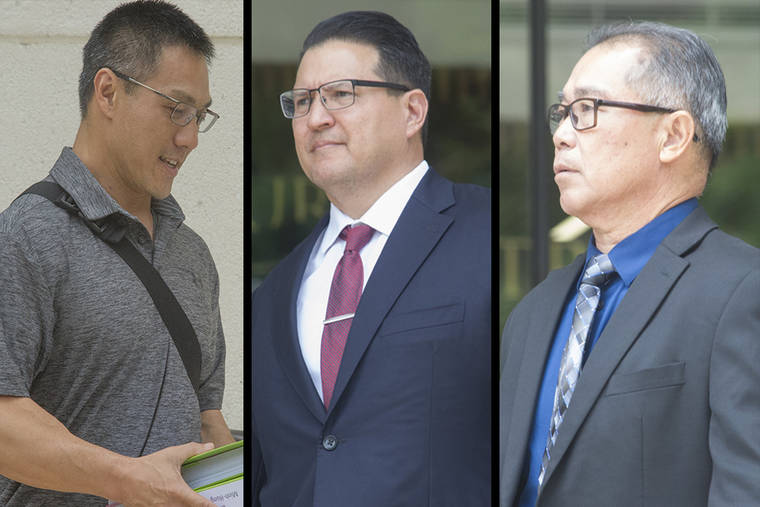
PHOTOS BY CRAIG T. KOJIMA / CKOJIMA@STARADVERTISER.COM
The Kealohas and the three co-defendants — officer Minh-Hung “Bobby” Nguyen, left, Lt. Derek Wayne Hahn and retired Maj. Gordon Shiraishi — are accused of framing Gerard Puana to discredit him in a family financial dispute he was having with Katherine Kealoha.
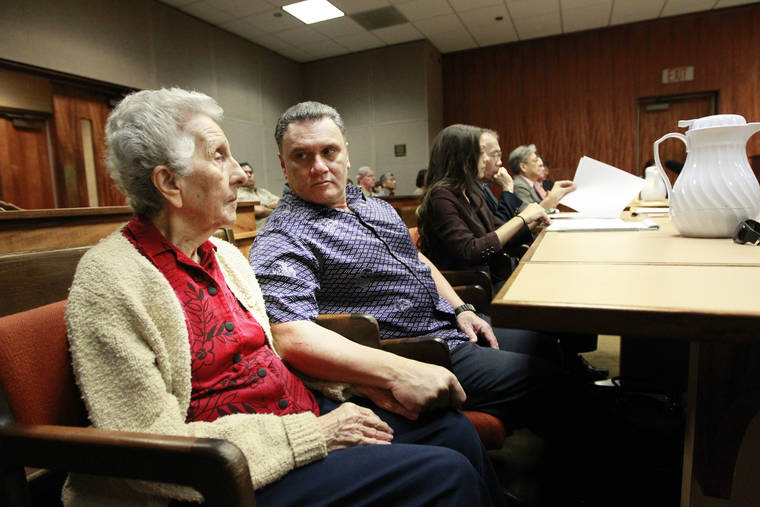
GEORGE F. LEE / FEB. 12, 2015
Florence Puana, left, and Gerard Puana listen to the verdict in a civil suit against Katherine Kealoha in 2015. The suit pitted the Puanas and Kealoha over a money derived from a reverse mortgage on Florence Puana’s home.









It took jurors one day of deliberations to find Katherine and Louis Kealoha — and two of their three fellow defendants — guilty of conspiracy and obstruction of justice today in one of the largest public corruption cases in Hawaii’s history.
Katherine Kealoha, the former deputy prosecutor, her husband, former Honolulu police Chief Louis Kealoha, HPD officer Minh-Hung “Bobby” Nguyen and Lt. Derek Wayne Hahn remained free on bond.
Only retired HPD Maj. Gordon Shiraishi was acquitted of all charges and was immediately released from bond.
Prosecutors asked that Katherine Kealoha be taken into custody immediately but U.S. District Court Chief Judge J. Michael Seabright said that can be discussed at a hearing scheduled for Friday morning.
But Seabright told the newly convicted defendants and their attorneys that they remained on bond and “the presumption of innocence no longer applies.”
Katherine Kealoha’s sentencing is scheduled for Oct. 7, followed by Louis Kealoha on Oct. 15, Hahn on Oct. 21 and Nguyen on Oct. 28.
Don't miss out on what's happening!
Stay in touch with breaking news, as it happens, conveniently in your email inbox. It's FREE!
The obstruction conviction is punishable by up to 20 years in prison and the penalty for conspiracy is up to five years.
The Kealohas left the federal court building less than an hour after the verdict was read. Katherine Kealoha said nothing to reporters while Louis Kealoha said, “There’s still a lot to take in. … I just want to thank everybody especially the community for their continued love and support. That’s all I have to say.”
His successor, Honolulu Police Chief Susan Ballard, issued a statement that said, “The damage caused by this small group of individuals hurt both the community and the department. But the men and women of the HPD have been working hard this past year and a half to restore HPD’s reputation and the public’s trust. We are moving forward and are committed to making sure that Honolulu continues to be one of the safest cities in the nation.”
Mayor Kirk Caldwell issued a statement, saying, “The jury has reached a verdict and I respect the process and their decision. It’s time to move on.”
Word that a verdict came just before 4 p.m., after only one full day of deliberations. The jury was handed the case Wednesday afternoon after hearing from 71 witnesses in 16 days of testimony, followed by three days of closing arguments and the prosecutions’ rebuttal.
The five defendants were accused of conspiring to frame Gerard Puana, Katherine Kealoha’s uncle, for the alleged theft of the Kealohas’ Kahala mailbox in 2013 and then lying to federal authorities about their actions.
Alexander Silvert, a deputy federal public defender who represented Gerard Puana, first brought the conspiracy case to the attention of the FBI after the criminal case against his client was dismissed.
Silvert called Puana after today’s verdict and said: “He’s very emotional, really feels vindicated for the first time in a long time. He can barely speak.”
“I think this sends a strong message to law enforcement and the community that if you abuse your power to frame an innocent man you’re going to be held accountable. On behalf of the Puanas we are very grateful that someone has believed their story.”
None of the defendants took the witness stand in their defense.
Only Shiraishi was exonerated.
Jurors, who declined to comment to reporters, appeared to believe that Shiraishi was merely confused when he falsely testified to a grand jury and to the Honolulu Ethics Commission about when he was notified by Chief Kealoha about the theft of the mailbox.
Federal prosecutors on Tuesday told jurors that the conspiracy case against the Kealohas and their three fellow defendants was a story of “corruption, abuse of power, greed and manipulation.”
“This case is about the setup and the cover-up,” said Assistant U.S. Attorney Joseph Orabona, who gave the prosecution’s closing argument in a packed courtroom, with an overflow crowd watching from an adjacent room through a video feed.
Orabona told the jurors that everyone involved in a conspiracy is liable for each other’s actions.
Under the U.S. Supreme Court’s “Pinkerton Rule,” he said, “if you’re in for an inch, you’re in for the mile. You’re in for the whole thing.”
Prosecutors said during closing arguments the alleged conspiracy was meant to discredit Puana because of a 2013 lawsuit that he and his mother, Florence Puana, filed against Katherine Kealoha, accusing her of stealing hundreds of thousands of dollars.
>> Follow all our coverage of the Kealohas here. Opens in a new tab
Attorney Randall Hironaka, who represents Nguyen, went through the main evidence against his client in his closing argument and told jurors that the government relied on key witnesses who are not credible and that the evidence failed to prove a conspiracy.
Attorney Lars Isaacson, who represents Shiraishi, also called into question the strength of the government’s case, saying there was no evidence proving a conspiracy and there were legitimate, reasonable explanations to counter the prosecution’s allegations against his client.
The defense attorneys for the Kealohas and Hahn said the government fell well short of meeting its burden of proof, didn’t show that the defendants agreed to conspire to frame Gerard Puana, and concocted a theory that Rustam Barbee, Louis Kealoha’s attorney, said was “based on suspicion, speculation and imagination.”
“There’s no evidence of this imaginary frame job,” Barbee said, calling the conspiracy theory far-fetched, bizarre, complicated and nonsensical and questioning an intensive federal investigation dating to 2015 that has produced no other suspect than Gerard Puana.
Katherine Kealoha’s dispute with her estranged uncle and grandmother Florence Puana took center stage during the federal trial, which covered 16 days of testimony from 71 witnesses, including three who took the stand for both sides.
In his closing argument, Orabona walked jurors through the prosecution’s case against all five defendants and said that Nguyen, Hahn and Shiraishi are all complicit with the Kealohas.
So the criminal actions of Nguyen, Hahn and Shiraishi also implicate the Kealohas, Orabona said.
For instance, Orabona said, Nguyen provided false testimony to a federal grand jury about the theft of the Kealohas’ mailbox.
“In for a penny, in for a pound,” Orabona told the jury. “All of the other defendants are also guilty of committing the same crime. … There is a treasure trove of false testimony, statements and reports by the defendants in this case.”
The defense attorneys argued that if their clients are acquitted of the main charges against them, then the Pinkerton Rule also means that the other defendants also must be found not guilty.
During his closing, Orabona showed jurors a graphic that referred to the Honolulu Police Department’s Criminal Intelligence Unit as “The Secret Police.”
“In this case the secret police … includes Katherine Kealoha,” Orabona said. “She’s part of this band of secret police.”
In his instructions to the jury, Judge Seabright read lengthy instructions that included references to the 1946 Pinkerton Rule, which held a brother liable for his brother’s action in an Internal Revenue Code case.
Seabright told jurors that anyone who joins a conspiracy is as guilty as the “originators” and does not need to be aware of all of the details in order to be guilty.
To find any of the five defendants guilty, Seabright told the jurors they have to unanimously vote that the prosecution proved its case “beyond a reasonable doubt.”
In his closing argument, Orabona said the defendants don’t have to have a written agreement to be guilty of conspiracy.
“Actions speak louder than words for a conspiracy,” he told the jurors.
The government says the defendants conspired against Puana to undermine him in a family dispute over money. Puana and his mother had figured out that Katherine Kealoha used a reverse mortgage scheme to pay for a Mercedes-Benz, a Maserati, a trip to Disneyland and other expenses, including utility bills and a $23,976 breakfast at the Sheraton Waikiki to celebrate Louis Kealoha’s selection as chief.
Kealoha closed a joint bank account with her grandmother to handle the reverse mortgage finances, only to discover that Puana already had gotten the bank’s statements of where the money had gone, Orabona said.
“The truth is that Katherine Kealoha had spent $135,000 of Florence Puana’s money in six months,” Orabona said. “She didn’t pay off the mortgage in six months as promised. Instead her greed controlled her actions.”
If the reverse mortgage scheme became public, Orabona said, “Katherine Kealoha and Louis Kealoha, they lose everything. That’s a powerful motive. … The solution is to silence them (Gerard and Florence Puana).”
So June 19 through 30, 2013, begins “the 12 days of scheming,” Orabona said. “The conspiracy takes off. … Katherine, one, knows that Florence has the (bank) statements. She needs a plan to discredit Florence and Gerard. They set up to frame Gerard Puana,” along with a failed attempt to have Gerard Puana charged with elder abuse of his mother, Florence Puana, according to Orabona.
Cynthia Kagiwada, Katherine Kealoha’s attorney, told jurors that the government’s case had “lots of reasonable doubt,” that Gerard Puana was not credible and lashed out at her client when he got angry and that what prosecutors called “lies” could be explained through “alternative explanations,” creating reasonable doubt.
Kagiwada said Puana hopes Katherine Kealoha is convicted so he may not have to pay her a large award pending from a civil lawsuit that Puana and his mother lost against Kealoha.
Regarding the mailbox case, Kagiwada questioned the prosecution’s contention that the mailbox was “prepped” in advance so it could be easily removed from its pedestal in June 2013.
The government produced “absolutely no evidence” to that effect, and its own witness testified that the mailbox was assembled improperly, according to Kagiwada.
She also faulted the prosecution’s contention that the defendants exchanged many cellphone calls and text messages “to get their story straight” about the alleged conspiracy.
The government analysis showed only contacts, not content — what the defendants actually discussed — creating more reasonable doubt, the defense attorneys argued.
Kagiwada also said the prosecution’s focus on Alison Lee Wong, a notary public the government says does not exist and was created by Katherine Kealoha as part of the conspiracy, was misplaced because she “has no bearing on this case whatsoever.”
The prosecution provided no evidence that the trust document linked to Wong was used for anything other than its intended purpose: to purchase a condo for Gerard Puana using his mother’s reverse mortgage proceeds, Kagiwada argued.
Birney Bervar, attorney for Hahn, said there was no evidence that his client was involved in the family dispute involving the Puanas and that he didn’t even know them.
“He had absolutely no motive to frame Gerard Puana,” Bervar said.
What’s more, Bervar added, there is no evidence that his client benefited financially from the alleged conspiracy.
“Derek is just doing his job at HPD,” Bervar said.
He also said the only direct evidence against his client came from testimony of Niall Silva, a former CIU officer who pleaded guilty in the conspiracy case to filing falsified reports and lying repeatedly to the FBI and a federal grand jury.
“Lying Niall is lying again,” Bervar said.
Surveillance video from Louis and Katherine Kealohas’ Kahala home. The video was presented as evidence in the Kealohas’ mailbox trial.
——— PREVIOUS COVERAGE —————
BREAKING NEWS:
Louis and Katherine Kealoha were found guilty of conspiracy today in an unanimous verdict in one of the largest public corruption cases in the history of Hawaii.
The Kealohas were found guilty of three counts of obstruction of justice, and co-defendants Lt. Derek Wayne Hahn and officer Minh-Hung “Bobby” Nguyen were also found guilty of obstruction.
Retired Maj. Gordon Shiraishi was found not guilty on all charges.
Sentencing dates for the convicted defendants are: Katherine Kealoha, Oct. 7; Louis Kealoha, Oct. 15; Hahn, Oct. 21 and Nguyen, Oct. 28.
The prosecutor asked to remand Katherine Kealoha into custody immediately but federal Judge J. Michael Seabright said that can be discussed in a hearing Friday.
The Kealohas left the court building less than an hour after the verdict was read, with Louis Kealoha saying that “it’s a lot to sink in.” He also thanked the community for its support.
Hahn, Nguyen and Shiraishi left the federal court building one-by-one without talking to reporters waiting outside.
Former Honolulu police Chief Louis Kealoha, his wife, former Deputy Prosecutor Katherine Kealoha, and the three current and former HPD officers were charged with conspiring to frame Katherine Kealoha’s uncle for the alleged theft of the couple’s Kahala mailbox in 2013 and then lied about their actions to federal investigators. The Kealohas and the three co-defendants — Lt. Derek Wayne Hahn, officer Minh-Hung “Bobby” Nguyen and retired Maj. Gordon Shiraishi — were accused of framing Gerard Puana to discredit him in a family financial dispute he was having with Katherine Kealoha. Several months before the mailbox allegedly was stolen, Puana and his mother, Florence Puana, sued Katherine Kealoha, alleging she stole hundreds of thousands of dollars from them. A jury eventually sided with Katherine Kealoha
——————————
THE CHARGES
Here is the list of counts:
COUNT 1
All defendants charged
The conspiracy offense alleges that the defendants agreed to commit four crimes against the U.S.
To find a defendant guilty, the jury must unanimously find that there was an agreement to commit at least one of the four crimes, with all agreeing to the particular crime that was committed.
The four crimes alleged:
• Deprivation of Gerard Puana’s civil rights
• Obstruction of an official proceeding in this case by making false statements in the criminal trial of Puana in 2014 or before the federal grand jury. The false statement had to be material to the official proceeding, tending to influence or having the potential to influence it. The defendant had to have acted corruptly, with the intent of obstructing justice.
• False statement to a federal government agency. The statement was made in a matter within the jurisdiction to the FBI or the U.S. Postal Inspection Service, the defendant acted willfully and the statement was material to the FBI or Postal Inspection activities.
• Obstruction of justice by knowingly altering or falsifying a document or tangible object and acting with intent to impede or influence an actual or contemplated investigation.
The jury must decided whether there was a conspiracy as charged and, if so, who its members were. If it determines no conspiracy existed, all defendants must be found not guilty of Count 1. Similarly, if the jury finds a defendant was not a member of the charged conspiracy but another one, the defendant must be found not guilty.
COUNT 2
Louis Kealoha charged with intent to obstruct an official proceeding
Around Dec. 4, 2014, during the criminal trial of Gerard Puana, Kealoha attempted to obstruct an official proceeding by testifying falsely that the person depicted in the surveillance video of the alleged mailbox theft on June 21, 2013, was Puana.
PINKERTON RULE
A member of a conspiracy who commits another crime to advance the goals or objectives of the conspiracy may be considered to be acting as the agent of the other conspiracy members. The illegal actions of the conspirator may be attributed to other individuals who were at the time members of the conspiracy. Under certain conditions, a defendant may be found guilty of this other crime even though he or she did not participate directly in committing the offense.
Pinkerton applies to Counts 2, 3, 6, 8 and 10.
COUNT 2 Pinkerton defendants
• Katherine Kealoha
• Derek Wayne Hahn
• Ming-Hung “Bobby” Nguyen
The three defendants under the Pinkerton rule can be found guilty only if Louis Kealoha is found guilty of Count 2 and Count 1, Louis committed the obstruction offense in furtherance of the conspiracy and the three other defendants also were members of the same conspiracy at the time the Count 2 charge was committed.
The elements of the Count 2 charge against the Pinkerton defendants are to be considered separately.
COUNT 3
Attempt to obstruct an official proceeding
Gordon Shiraishi is charged with this offense.
Around Jan. 7, 2016, the defendant attempted to impede an official proceeding by falsely testifying to the federal grand jury. He told the grand jury that he received a call about 9 a.m. on June 22, 2013, on his cell phone from Louis Kealoha about the missing mailbox and that Shirashi called Derek Wayne Hahn and directed him to send a CIU technician to the Kealohas’ residence to recover the hard drive from the video surveillance system.
COUNT 3 Pinkenton defendants
• Katherine Kealoha
• Louis Kealoha
• Derek Wayne Hahn
• Ming-Hung “Bobby” Nguyen
The four defendants under the Pinkerton rule can be found guilty only if Gordon Shiraishi was found guilty of Counts 3 and 1, committed Count 3 in furtherance of the conspiracy and the other four defendants also were members of the conspiracy at the time the Count 3 offense was committed.
The elements of the Count 3 charge against the Pinkerton defendants are to be considered separately.
COUNT 6
Attempt to obstruct an official proceeding
Ming-Hung “Bobby” Nguyen is charged with this offense.
Around April 21, 2016, Nguyen attempted to impede or influence an official proceeding by testifying falsely to the federal grand jury, saying he was standing next to Niall Silva at the Kealoha residence when the video hard drive was retrieved and that Puana was the person in the video.
Count 6 Pinkerton defendants
• Katherine Kealoha
• Louis Kealoha
• Derek Wayne Hahn
• Gordon Shiraishi
The four defendants under the Pinkerton rule can be found guilty only if Nguyen was found guilty of Counts 6 and 1, committed Count 6 in furtherance of the conspiracy and the other four defendants also were members of the same conspiracy at the time the Count 6 offense was committed.
The elements of the Count 6 charge against the Pinkerton defendants are to be considered separately.
COUNT 8
Attempt to obstruct an official proceeding
Around May 19, 2016, Nguyen attempted to influence or obstruct an official proceeding by making a false statement before the grand jury.
Count 8 Pinkerton defendants
• Katherine Kealoha
• Louis Kealoha
• Derek Wayne Hahn
• Gordon Shiraishi
The four defendants under the Pinkerton rule can be found guilty only if Nguyen was found guilty of Counts 8 and 1, committed Count 8 in furtherance of the conspiracy and the other four defendants also were members of the same conspiracy at the time the Count 8 offense was committed.
Count 10
Making a false statement
Gordon Shiraishi is charged with willfully making a false statement in a matter within the jurisdiction of a federal agency.
Around Nov. 16, 2015, the defendant falsely stated to the FBI that on June 22, 2013, at around 9 a.m. he received a call on his cell phone from Louis Kealoha complaining that his mailbox was gone and that Shiraishi contacted Derek Hahn and told him to send a CIU technician to the chief’s house to examine video surveillance footage.
Count 10 Pinkerton defendants
• Katherine Kealoha
• Louis Kealoha
• Derek Wayne Hahn
• Minh-Hung “Bobby” Nguyen
The four defendants under the Pinkerton rule can be found guilty only if Shiraishi is found guilty of Counts 10 and 1, committed Count 10 in furtherance of the conspiracy and the other four defendants also were members of the same conspiracy at the time the Count 10 offense was committed.
Gordon Y.K. Pang, Susan Essoyan and Leila Fujimori contributed to this report.




